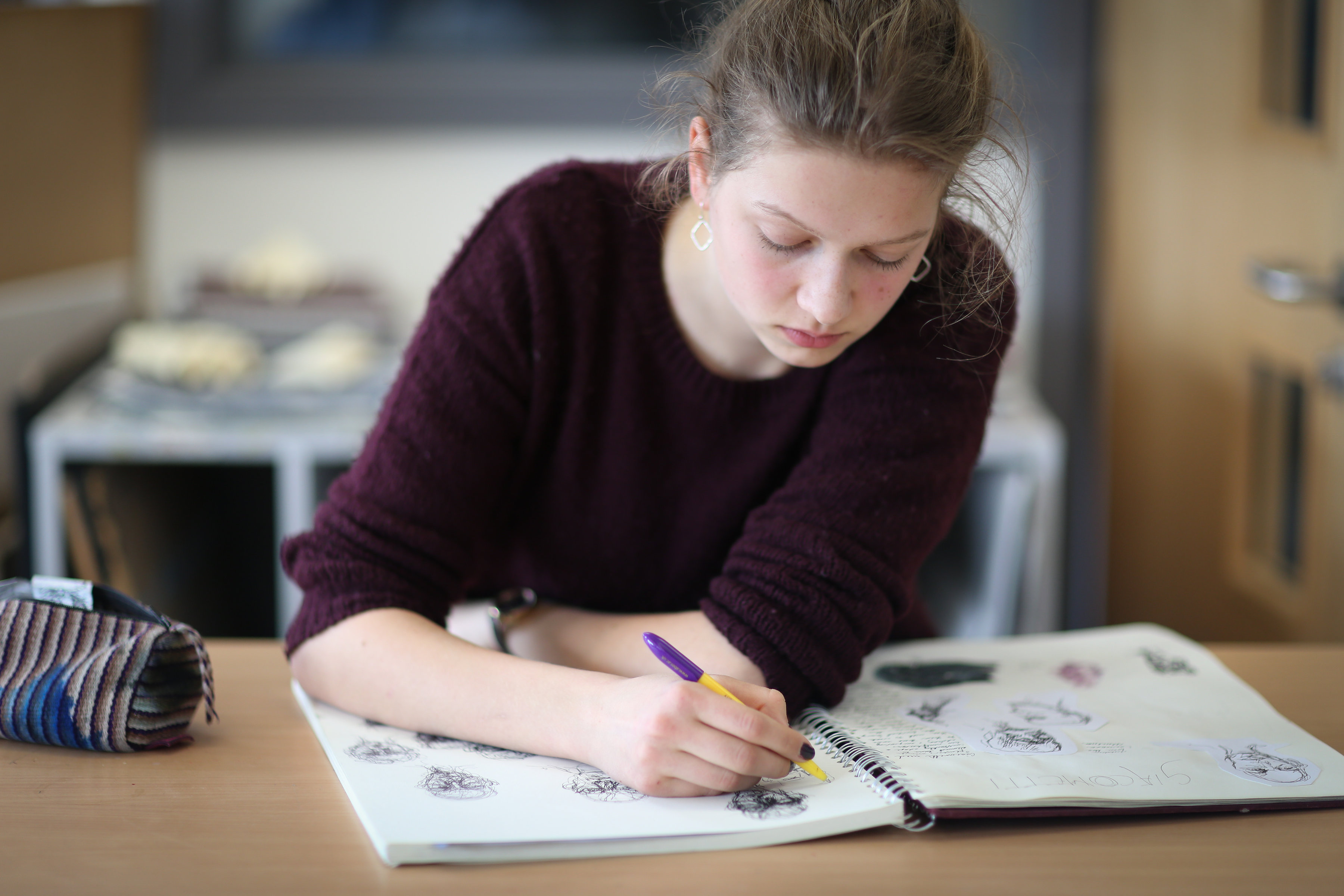The International Baccalaureate (IB) is a modern study programme with a broad curriculum and emphasis on study skills, community service and internationalism. The IB was originally launched in 1968 and now involves some 80,000 students studying in 125 countries. It is highly regarded internationally and recognised by all UK universities.
Students study six subjects: three at higher level and three at standard level, with the organisation of subject choices ensuring that they maintain a breadth of study across English, Mathematics, Science, Humanities, Languages and Arts. As well as academic skills, IB students are asked to demonstrate initiative, independence and organisation.
- Theory of Knowledge and
- Creativity, Action and Service.
Students reflect upon both their academic subjects and their personal development. They also participate in creative, physical and service activities in the local community.
We recommend the IB Diploma as it offers:
- breadth of subjects which keeps university options open;
- outstanding skills for university and the work place linking subject areas;
- an international perspective and internationally recognised qualification;
- development of the skills of critical thinking.
The aims of the IB Diploma include:
- The development of thinking skills and the capacity to reflect upon and evaluate actions critically.
- The education of the whole person, emphasising intellectual, personal, emotional and social growth.
- The promotion of international understanding.
Benefits of studying on the IB Diploma programme:
- linguistic acquisition and development;
- cross-disciplinary and reflective learning, critical thinking;
- flexibility in the choice of a personal study programme;
- efficient planning and organisation, work self-management;
- motivation and encouragement;
- research and collaboration;
- intercultural awareness;
- transfer of skills and knowledge to real world contexts;
- creative experiences of action and service;
- contact with students around the world through the IB alumni network.

The IBO Mission Statement
“The International Baccalaureate Organisation aims to develop inquiring, knowledgeable and caring young people who help to create a better and more peaceful world through intercultural understanding and respect. To this end, the IBO works with schools, governments and international organisations to develop challenging programmes of international education and rigorous assessment. These programmes encourage students across the world to become active, compassionate and lifelong learners who understand that other people, with their differences, can be right.”
How is the IB Diploma different from A Levels?
The IB Diploma is different from A Levels in that it is a complete programme studied over two years in the Sixth Form with all students taking six subjects chosen from groups that represent the major domains of learning across all areas of a curriculum. This allows students to continue studying a breadth of disciplines while also studying in depth. The programme is linear and is assessed in May at the end of the two-year course with the results published in early July. In addition to the chosen six subjects students follow the core elements of the Diploma that include a course in the Theory of Knowledge, an extended essay and a programme of Creativity, Activity and Service (CAS). To be awarded the IB Diploma students must successfully complete all parts of the programme.
The early release of IB results means that many students are able to enjoy their summer, safe in the knowledge that they have achieved the grades they require to accept their university place.
What is the difference between Higher and Standard Level?
Higher Level courses require a greater depth of study across a broad range of content and Standard Level courses provide a breadth of study across the whole programme. Higher Level courses normally have 5 periods each week (representing 240 hours over the two years) and Standard Level 3 periods each week (representing 150 hours). Theory of Knowledge will have up to 2 periods each week (representing 100 hours). This represents up to 26 teaching periods each week.
Does the Diploma involve coursework?
All IB Diploma courses involve an element of coursework (ranging between 20% and 50% of the final mark for the subject) and this is spread over the two years of the programme.
What are the subject areas in the Diploma?
The IB Diploma programme involves the study of subjects chosen from each of the six groups:
- Group 1: Language/Literature (usually your native tongue);
- Group 2: A second language (another modern language);
- Group 3: Individuals and Society (Economics, Geography, History, Psychology);
- Group 4: Experimental Sciences (Biology, Chemistry, Physics);
- Group 5: Mathematics;
- Group 6: The Arts.
From the courses offered, students must choose one subject from each group, three at Higher and three at Standard Level. However, it is possible to opt not to take a Group 6 subject but instead take another subject from Groups 2 to 4 subject to availability.

How is the IB Diploma Award assessed?
Each subject examined is graded on a scale of 1 (lowest) to 7 (highest). The maximum for all six subjects is 42 points. There are up to 3 extra points for both the Theory of Knowledge (essay and presentation) and the extended essay making a total of 45 points. To obtain a Diploma, students will normally have to achieve a score of 24 points and have successfully completed all components of the programme.
How do universities regard the IB Diploma?
The IB Diploma is internationally recognised as a rigorous pre-university qualification and universities in the UK and abroad accept that the programme goes beyond the academic disciplines, with considerable candidate achievement across the subjects, together with the Theory of Knowledge, extended essay and CAS. The flexibility in choice of subjects within the Diploma programme allows students to pursue areas of personal interest and to meet any special requirements for university entrance. Those students who have studied the IB Diploma Programme are regarded as having developed the skills for independent study to a high level and are exceptionally well prepared for higher education as well as employment. Universities will usually ask for a points score for entry.
What if I do not successfully complete all of the components of the Diploma?
Candidates who do not complete the full Diploma successfully can be awarded certificates for the subjects passed. It is possible to re-sit exams if unsuccessful.
Am I suited to the IB Diploma Programme?
The IB Diploma course does not require a student to be brilliant at all subjects but does require a high level of motivation and organisation. If you wish to continue studying a broad range of subjects and keep your options open for your university course or eventual career, then the wide ranging and rigorous IB Diploma course might be for you.
Theory of Knowledge
The Theory of Knowledge (TOK) aspect of the IB is fundamental to the way the whole Diploma course operates. TOK comes into the way each subject in every one of the six groups is taught. In addition there will be two timetabled periods per week dedicated to discussion and development of ideas. The main theme of TOK is a questioning approach. Knowledge and “known facts” are considered – are they true, and can we be sure that they are true? Contemporary, moral and ethical issues, will all be debated. Students will study the way in which a number of different subject areas approach “truth”. The areas are Mathematics, Natural Sciences, Human Sciences, History, Religious Systems, Indigenous Systems, Arts and Ethics.
The assessment for TOK will be in two parts. The first is an essay – the choice of titles is given by the IBO. Students will also have to prepare, give and evaluate a presentation for the rest of the class on a topic of their choice, assessed by the teacher.
Creativity, Activity, Service (CAS)
The IB Programme was designed to meet the needs of a well-rounded student. The Creative, Active, and Service (CAS) requirements encourage IB students to excel in non-academic pursuits.
The CAS programme formally begins at the start of the Diploma and continues regularly, for at least 18 months with a balance between creativity, activity, and service.
Students engage in CAS experiences involving one or more of the three CAS strands. A CAS experience can be a single event or may be an extended series of events. In addition, students undertake a CAS project of at least one month’s duration that challenges students to show initiative, demonstrate perseverance, and develop skills such as collaboration, problem-solving, and decision-making.
Popular CAS experiences/projects at Sidcot are: the Tanzania project, Peace Jam, Take Ten, Peace Festival/Sidfest, Charity fundraising, Sidcot Saturdays which involve a wide range of sport, art, cultural activities, volunteer work in the Junior School, help during school events, Drama productions, Duke of Edinburgh, SAGE, SPICE, Sports, Language exchange, Quaker events.
In summary, the students must learn to balance a demanding academic programme with a busy social life and become respected for their energy and enthusiasm. All CAS students are expected to maintain and complete a CAS portfolio, a collection of evidence that showcases experiences of the seven CAS learning outcomes and for student reflections. It is not formally assessed.
Testimonials
Nina managed a world class maximum score of 45 points from a possible 45. This puts Nina in the top 200 students worldwide taking the IB and equates to around five A*s at A Level. Incredibly, on top of the rigorous workload of the IB, Nina managed to fit in an AS Level in Art, for which she achieved an A grade.
Reflecting on her success, Nina said:
“I chose the IB because I liked the broad range of subjects it offered, meaning I could keep learning more of the subjects I had enjoyed at GCSE. I did Psychology, Chemistry, Biology, English, Maths and French... I am applying to do Human Sciences at Oxford at the moment but I’m also looking at Anthropology courses as it’s an area that I also find really interesting.”
Freddie achieved an outstanding 36 points, equivalent to three A*s and two As at A level. Freddie studied English, Economics, Chemistry, French, History and Maths Studies. He is currently applying for jobs and hopes to pursue a career in the railway industry.
Freddie said:
“I chose to take the IB as the style of learning interested me. I felt it would really prepare me well for life after school and the challenge of studying six subjects appealed to me. The element I enjoyed most was the voluntary work and Sidcot provided incredible opportunities and support, to help me grow as a person.”
10 Reasons why the IB Diploma Programme is ideal preparation for university
It increases academic opportunity
Research* shows that IB graduates are much more likely to be enrolled at top higher education institutions than entrants holding other qualifications.
IB students care about more than just results
Through creativity, action, service (CAS) you learn outside the classroom and develop emotionally and ethically as well as intellectually.
It encourages you to become a confident and independent learner
For example, the extended essay requires independent research through an in-depth study.
It’s an international qualification
The DP is recognized globally by universities and employers.
Graduates are globally minded
Language classes encourage an international mindset, key for increasingly globalized societies.
The IB encourages critical thinking
Learn how to analyse and evaluate issues, generate ideas and consider new perspectives.
IB students have proven time management skills
Take good study habits and strong time management to further education and the working world.
It assesses more than examination techniques
Learn to understand, not just acts or topics and or exams.
Subjects are not taught in isolation
Theory of knowledge (TOK) classes encourage you to make connections between subjects.
It encourages breadth and depth of learning
You are able to choose courses from six subject groups and study subjects at different levels.
* Based on IBO research – www.ibo.org/research.
About the author
| Graham Hartley is IB Co-Ordinator at Sidcot School. |
